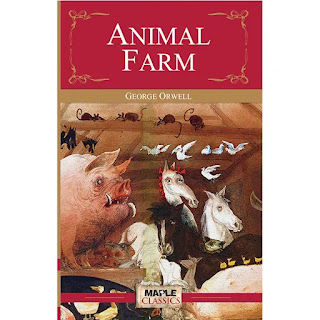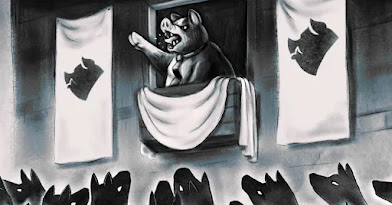“If liberty means anything at all, it means the right to tell people what they do not want to hear.”
— George Orwell
# Discuss the plot line of ‘Animal Farm’ by George Oewell.
Introduction
George Orwell’s Animal Farm (1945) is a powerful allegorical novella that uses the setting of a farm to explore the rise of totalitarianism. With its deceptively simple narrative and talking animals, Orwell crafts a biting critique of Soviet communism and the betrayal of revolutionary ideals. While it may appear as a fable, Animal Farm is deeply political, with each character symbolizing real historical figures or ideologies from the Russian Revolution and beyond.
Plot Summary of Animal Farm
The story begins on Manor Farm, where the animals are oppressed by their negligent human master, Mr. Jones. Inspired by the dream of a wise old boar named Old Major, the animals rebel, overthrow Jones, and take over the farm. They rename it Animal Farm and set out to create a society where all animals are equal, free, and happy.
Under the leadership of the pigs—Snowball and Napoleon—the animals establish the Seven Commandments of Animalism, including the famous principle: "All animals are equal."
Soon, however, cracks begin to appear in this utopia.
Snowball, an idealistic and intelligent pig, proposes the construction of a windmill to improve productivity. But he is suddenly driven out by Napoleon, who uses a private army of dogs to seize power.
Napoleon gradually transforms into a tyrant, making deals with humans and rewriting history. He uses fear, propaganda (spread by the pig Squealer), and manipulation to maintain control.
The animals, especially the hardworking horse Boxer, continue to believe in the cause despite growing suffering and confusion. Boxer's motto, “I will work harder”, reflects his blind loyalty.
Over time, the pigs become indistinguishable from the humans they once overthrew. The commandments are secretly changed, and the final principle evolves into:
"All animals are equal, but some animals are more equal than others."
The novella ends with the chilling image of pigs and humans dining together, while the other animals watch, unable to tell who is who
Though set on a farm, the story’s implications are universal. It explores how ideals can be twisted, how truth can be manipulated, and how the oppressed can become oppressors. Orwell’s message is clear: without accountability and critical thought, even the noblest revolutions can devolve into tyranny.
#Critical Analysis
1. Allegory and Historical Parallels
At its core, Animal Farm is a political allegory of the Russian Revolution and the rise of Soviet communism.
Old Major, who dies before the revolution begins, represents Karl Marx or Lenin, the ideological founders of socialism.
Napoleon, the pig who becomes dictator, symbolizes Joseph Stalin ruthless, power-hungry, and manipulative.
Snowball mirrors Leon Trotsky, the idealist who is exiled and erased from history.
Boxer, the loyal cart-horse, stands for the working class, exploited for their labor and discarded when no longer useful.
Even the farm itself is a metaphor for the Soviet Union: a land of broken promises and failed utopia.
Through this symbolism, Orwell reveals how revolutions, despite their noble origins, are vulnerable to corruption and hypocrisy.
2. Power and Corruption
One of Orwell’s central concerns is the corrupting nature of power. The initial goal of equality quickly dissolves as the pigs seize control. As Napoleon rises to power, Orwell demonstrates how:
Fear (through the dogs),
Propaganda (through Squealer),
and Control of Resources (such as food and education)
are used to dominate and silence dissent. The famous transformation of the commandments—culminating in "All animals are equal, but some animals are more equal than others"—illustrates the terrifying elasticity of language when twisted for authoritarian purposes.
3. Propaganda and Language
Orwell had a deep interest in the manipulation of language as a political weapon (further explored in his later novel, 1984). In Animal Farm, Squealer, the pig spokesperson, constantly rewrites facts, reinterprets events, and rebrands lies as truth.
This propaganda allows the pigs to:
Rewrite history (Snowball’s role in the Battle of the Cowshed is erased),
Justify oppression (the windmill is always “almost finished”),
- And suppress opposition (any dissenters are labeled “traitors”).
Through this, Orwell shows how regimes maintain power not just through violence, but through control of information and narrative.
4. Betrayal of Ideals
Perhaps the most tragic element in Animal Farm is the betrayal of hope. The animals' dream of a just and equal society is steadily dismantled. Boxer, who believes unwaveringly in Animalism and the leadership, is ultimately betrayed—sent to the slaughterhouse when he can no longer work. His fate underscores how the state exploits workers and discards them when they’re no longer profitable.
The revolution doesn’t fail because of outside enemies, but because of the internal betrayal by those in power—a sharp commentary on how revolutions often become indistinguishable from the regimes they sought to overthrow.
5. Relevance Today
Though based on Soviet history, Animal Farm transcends time and place. In any nation where leaders:
Rewrite history,
Silence dissent,
Concentrate power,
And betray the public trust,
Orwell’s critique applies. The novella remains a universal warning: that without vigilance, accountability, and truth, any system capitalist, communist, or otherwise can fall prey to tyranny.




No comments:
Post a Comment